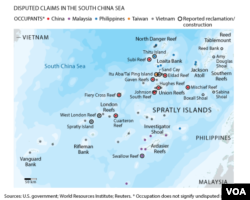Chinese state media are playing down the significance of President Barack Obama's two-day meeting with leaders from the 10 members of the Association of Southeast Asian Nations, or ASEAN, in Sunnylands California, saying the talks are unlikely to bring any striking geopolitical decisions.
Even so, opinion pieces and commentaries online highlighted Beijing’s concerns that the meeting may be used to forge a consensus about how to handle territorial disputes in the South China Sea.
An editorial in the Communist party-backed Global Times entitled “Sunnylands wrong place to discuss South China Sea Row” argued that while the desire of ASEAN nations and the U.S. to expand ties is real, most are unlikely to choose sides between Beijing and Washington.
“These countries may know that if they pick a side from either China or the United States, they would be controlled by it and used as leverage,” the opinion piece said.
It noted that while Vietnam has territorial disputes in the South China Sea with China, it has been cautious in “walking a fine line between Beijing and Washington.”
“Among the 10 ASEAN members, only the Philippines publicly adopts a pro-U.S. attitude, but it does not stand in complete opposition to China,” it added.
China is ASEAN’s biggest trade partner, but its claims to almost all of the South China Sea as its own and its rapid buildup of artificial islands there is a growing source of concern among Beijing’s Southeast Asian neighbors.
China insists that the disputes be handled between individual claimants and has long opposed what it calls outside interference in the issue. According to the Pentagon, China has reclaimed 2,900 acres of land in the South China Sea.
Just last month, it tested for the first time a 3,000 meter runway on one of the reclaimed islands in Fiery Cross Reef, landing civilian planes on the islet.
The United States says it does not take sides in the dispute, but has been increasingly taking steps to ensure freedom of navigation remains the norm.
"Here at this summit, we can advance our shared vision of a regional order where international rules and norms, including freedom of navigation, are upheld and where disputes are resolved through peaceful, legal means," President Obama said in his opening remarks.
President Obama’s remarks appeared to be aimed at sending a strong signal to China. But getting all of the leaders of ASEAN to agree on a strong statement may prove tricky, analysts say.
And if they do, some commentators online in China are already saying Beijing should let ASEAN pay an economic price.






